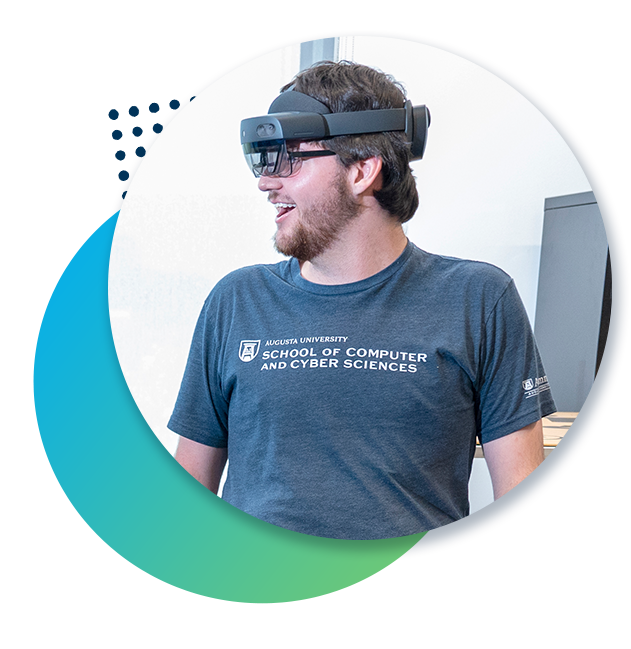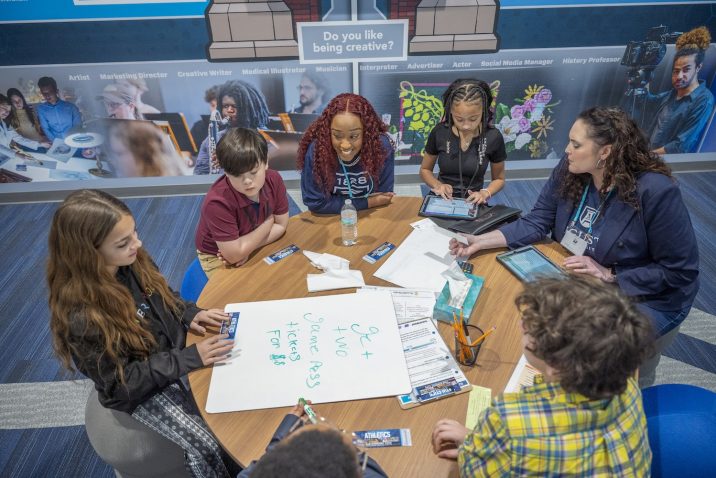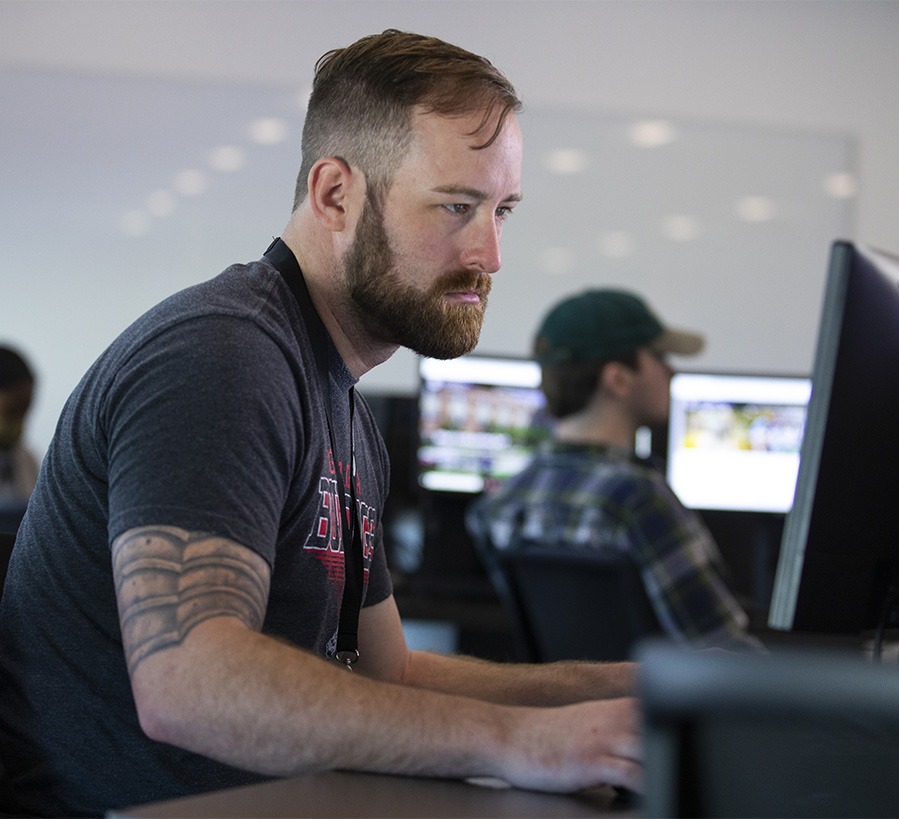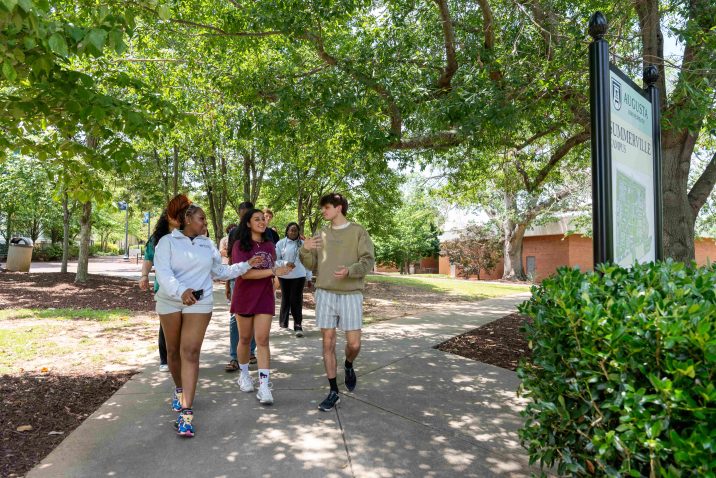Computer and Cyber Sciences
With a master’s in Computer Science, you’ll have the advanced computer science knowledge to tackle a wide range of computer science challenges or continue your education to pursue a career in applied research or academia.
The two-track program allows you to choose between a thesis-based track and a non-thesis-based track, giving you the opportunity to tailor your education to your specific professional objectives.
By choosing to earn your master’s in Computer Science from the School of Computer and Cyber Sciences at Augusta University, you’ll be joining a school experiencing unprecedented growth in a city that’s become a hub for talent and opportunity within the computer and cyber sciences industry.
Computer and Cyber Sciences is for you if you consider yourself
Life-Changing
Life-Saving
Education
Want to learn more about the Computer and Cyber Sciences program at Augusta University?
Request InfoWhat You'll Study
Coursework
Students in Augusta University’s Master of Science with a major in Computer Science program will complete 30 credit hours on either a full-time or part-time basis. The non-thesis option requires 15 hours of core classes and 15 hours of electives, while the thesis option adds nine credit hours of thesis research and six credit hours of electives.
The degree must be completed within five consecutive years.
Curriculum | Admissions Criteria | Tuition and Fees | Application Deadlines



EXPLORE. EXCEL. EXPAND.
Graduate School Advantage
Augusta University's graduate programs are among the best in the nation – and the world – and our graduate students are our most valuable assets. To ensure that our students earn more than a degree, the Graduate School offers a range of opportunities so they can develop the leadership, communication and personal skills needed for a rewarding life and academic, research or professional career.
See what the Graduate School has to offer »
About the Graduate SchoolExperience-based Education
Outside the Classroom
Because the home of Augusta University’s School of Computer and Cyber Sciences is the Georgia Cyber Center, the 332,000-square-foot facility that’s also home to a variety of public and private cybersecurity and computer science ventures, students have the opportunity to interact with researchers and industry professionals in the same facility they attend class.
The Georgia Cyber Center includes incubator/accelerator space for entrepreneurial cyber security companies, research labs, a 340-seat auditorium for public and private events and one of the nation’s few state-owned cyber ranges.
The city of Augusta is home to several high profile cyber organizations, providing excellent networking and professional development opportunities.
Tailored Learning
The two-track degree allows students to pursue the professional futures that excite them.
Financial Assistance
Graduate Assistantships may be available to selected full-time students based on research and teaching needs.
Rapid Growth
Since its establishment in 2017, the School of Computer and Cyber Sciences has doubled its enrollment, tripled the size of its faculty and added new academic degrees.
State-of-the-Art Facilities
The School of Computer and Cyber Sciences is located at the Georgia Cyber Center, providing students access to research labs, a cyber range and a host of research opportunities.
Your Future
Career Options
According to the U.S. Bureau of Labor Statistics, job growth for computer and information research scientists is projected to rise much faster than average over the next decade. The median pay for a computer and information research scientist is $145,080 per year.
Admissions Criteria at a Glance
GPA: Overall GPA of 3.0 on a 4.0 scale at the Baccalaureate level calculated on all undergraduate work.
Degree Requirement: Minimum of a Bachelor’s degree in Computer Science or a related field from an accredited college or university.
Transcripts: Official transcripts are required from all universities and colleges ever attended. Unofficial transcripts from US colleges and universities can be used in the admissions review process in lieu of official transcripts for this program.
Standardized Test Requirements: None are required for this program.
Letters of Recommendation: Recommendations from three individuals must be submitted through the application portal.
Resume: Applicants must submit a resume or curriculum vitae within the application portal.
International Students: Please review the verification process for international transcripts and the english proficiency requirement.
Tuition & Fees Estimate
$2,821*
Estimated total
Full-time / In-State / Per Semester
$236
Tuition Per Hour
$675
Mandatory Fees
View Detailed Program Tuition
*Tuition & Fees listed here are for in-state students enrolling in the university for Fall 2025 semester.
Detailed Program Tuition InformationApplication Deadlines
Spring '26 International Application Deadline
- August 1, 2025
Spring '26 Application Deadline
- November 15, 2025
Fall '26 International Application Deadline
- March 1, 2026
Fall '26 Application Deadline
- June 15, 2026
Early submission of all application materials is strongly advised.
All required application materials and documents must be received in order for an application to be considered complete and before an admission decision can be made. The program does not accept applications after the published application deadline, however the program will continue to accept application materials up to 2 weeks after the application deadline.

Why Augusta?
The interactive nature of the program allows you to work directly with the school’s internationally recognized faculty.
With the program located at the state-of-the-art Georgia Cyber Center, you’re not only learning in a world-class facility, you’re learning side-by-side with those already making a difference in the industry.
The objective-based focus of the degree allows you to choose the path that’s right for you, whether it’s directly entering the workforce or continuing your education to pursue a career in applied research.




